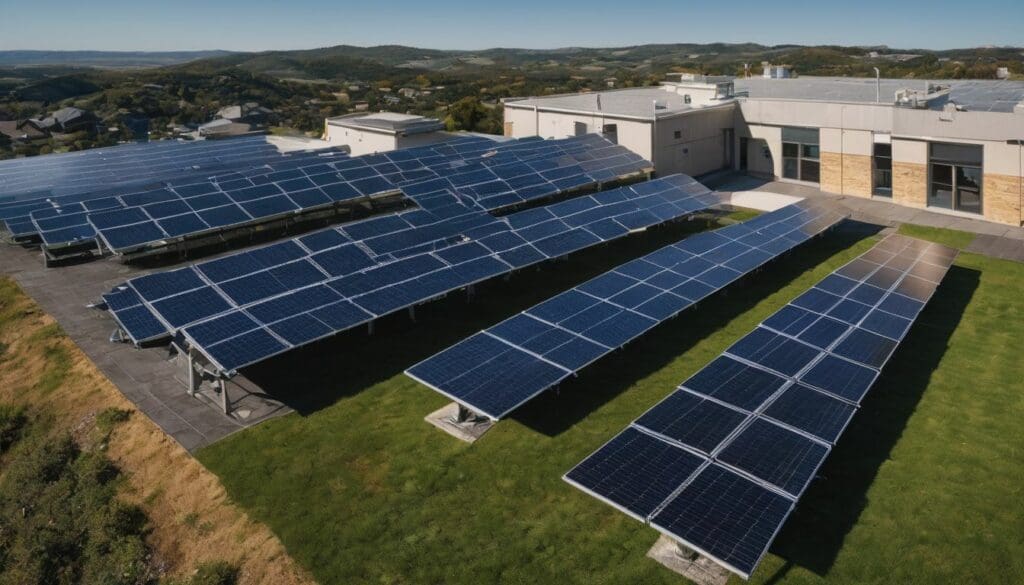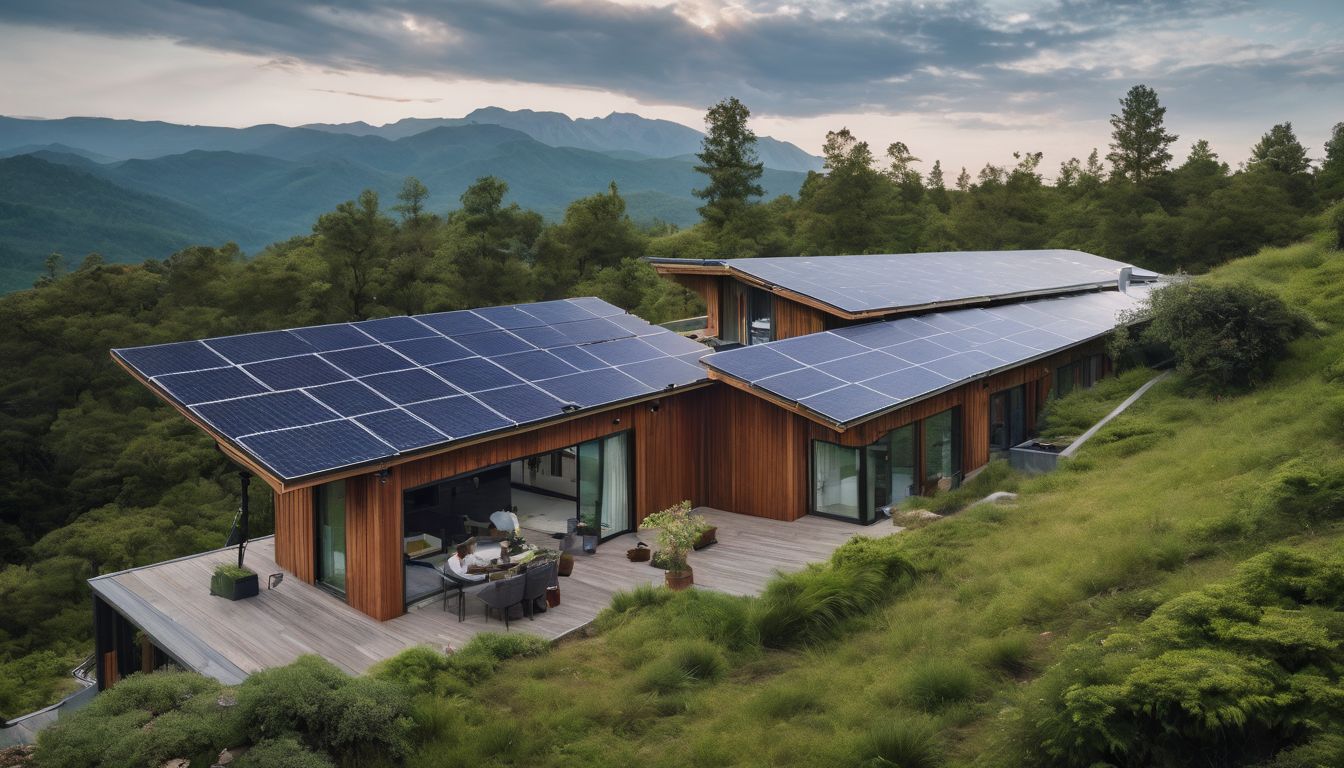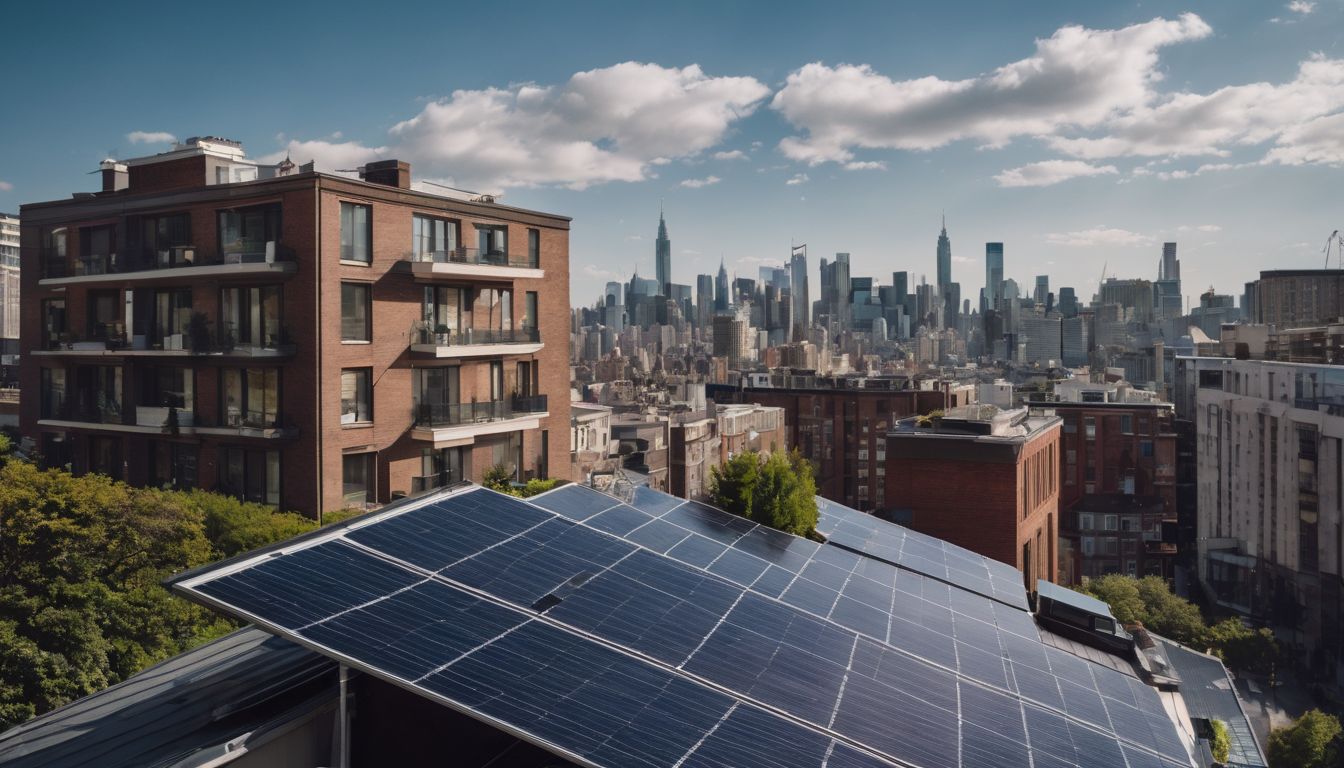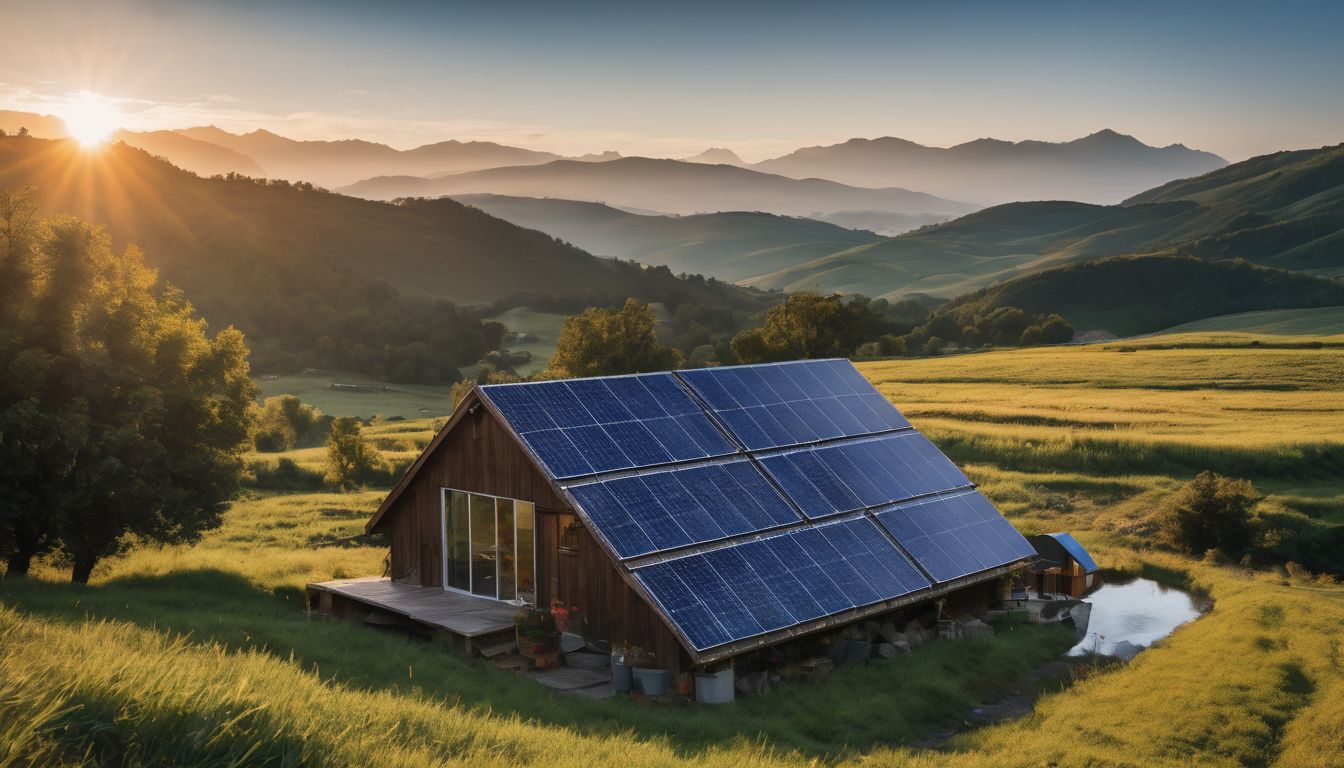Many people believe solar panels are too pricey and impractical. In reality, the cost of solar technology has plummeted by more than 70% in the last decade. This article will dispel common myths and reveal the truth about harnessing solar power for your home.
Get ready to see solar energy in a new light!
Key Takeaways
- Solar technology costs have significantly dropped, and government incentives like tax rebates and grants are available to offset installation expenses.
- Cold climates do not impede solar panel efficiency; in fact, low temperatures can improve their performance as they convert sunlight into electricity more effectively.
- Solar installations come with various warranties including power performance guarantees and equipment warranties, ensuring long-term reliability and peace of mind for owners.
- PV systems require minimal maintenance, mainly occasional cleaning, and professional inspections to ensure they operate optimally over time.
- While solar panels can generate excess energy on sunny days, net metering allows homeowners to feed this surplus back to the grid in exchange for credits against future bills.
Myth #1: Solar Panels Are Too Expensive
Despite the initial investment, there are cost-effective options for solar panels and numerous government incentives to help offset the upfront costs. With advancements in technology, solar panels have become more affordable and accessible for homeowners.
Cost-effective options
Many people think solar panels will break their bank, but that’s not the case anymore. Solar energy technology has progressed rapidly and prices have plummeted, making home solar energy systems much more affordable.
Nowadays, you get a wide range of options to suit various budgets and homes. From smaller setups just for essential appliances to full-scale sustainable solar panels that power entire houses, there’s something for everyone.
On top of lower prices, government incentives sweeten the deal further. Tax rebates and grants are available in many regions to help offset installation costs. Plus, with schemes like net metering, homeowners can earn credits on their electricity bills by sending excess renewable energy back into the grid.
These financial benefits make switching to clean energy an even smarter investment for those who care about sustainability and conservation.
Government incentives
To complement the cost-effective options, government incentives make solar panels even more attractive. These incentives come in various forms, including tax credits, rebates, and grants offered by local and national governments to encourage the adoption of sustainable energy solutions.
By taking advantage of these opportunities, individuals can significantly reduce the initial investment required for installing solar panels on their properties.
Furthermore, some regions offer feed-in tariffs that allow solar panel owners to sell excess electricity generated back to the grid at a favorable rate. This not only offsets their energy costs but also contributes towards creating a more sustainable and efficient energy system overall.
Myth #2: Solar Panels Don’t Work in Cold Climates
Despite the misconception, solar panels actually work efficiently in cold climates. In fact, they are more efficient at converting sunlight into electricity when the temperature is lower.
So, if you live in a colder climate, don’t let this myth discourage you from considering solar energy.
Efficiency of solar panels in cold temperatures
Solar panels are still efficient in cold temperatures, although their performance may be slightly reduced. The technology used in solar panels has improved significantly, making them more effective at generating electricity even on chilly days.
Additionally, snow can actually reflect sunlight and enhance the efficiency of the panels.
The decrease in temperature can also lead to a small increase in voltage and improve the overall performance of solar panels. Therefore, it is a common misconception that solar panels do not work well in cold climates when they are still capable of producing significant energy during winter months.
Myth #3: Solar Installations Do Not Have Warranties
Solar installations do come with warranties, including power performance guarantees, equipment warranties, inverter warranties, and labor and service warranties. Read on to learn more about the misconceptions surrounding solar panel warranties.
Power performance guarantees
Solar panel installations come with power performance guarantees to assure you that your system will produce a certain amount of energy over time. These guarantees provide peace of mind, especially when making a long-term investment in solar energy technologies.
They ensure that your panels will continue to generate electricity at an acceptable level throughout their lifespan, giving you the confidence that your solar investment will be worthwhile.
Understanding these power performance guarantees is crucial for those interested in installing solar panels and can help dispel misconceptions about the reliability and efficiency of solar energy systems.
Equipment warranties
Solar panel installations come with multiple warranties to protect your investment. Power performance guarantees ensure that the panels will produce a certain amount of energy over time, giving you peace of mind about their efficiency.
Inverter warranties cover the crucial component that converts solar energy into usable electricity. Additionally, labor and service warranties are often included to provide maintenance support for your system.
Understanding these equipment warranties is essential in ensuring the long-term success of your solar panel installation. It is important to consider both power performance and inverter guarantees when evaluating different systems to make an informed decision.
Inverter warranties
Inverter warranties typically cover the repair or replacement of solar inverters in case of malfunction. These warranties commonly last between 5 to 25 years, depending on the manufacturer and model.
It’s essential to review the warranty details before purchasing, ensuring they align with your system’s expected lifespan.
Solar inverters play a crucial role in converting the direct current (DC) from solar panels into alternating current (AC) for use in homes or businesses. Therefore, having a reliable inverter warranty protects against potential future expenses and ensures your solar energy system continues to function efficiently for years to come.
Labor and service warranties
Most solar installations come with labor and service warranties to ensure that any issues with the system are promptly addressed. These warranties cover the workmanship of the installation, providing peace of mind for the consumer.
It’s important to review these terms carefully when considering a solar installation to fully understand what is included in the warranty package.
Solar panel manufacturers often partner with certified installers who offer comprehensive labor and service warranties. These protect consumers from any potential defects or damage that may occur during or after installation.
Myth #4: PV Systems Require A Lot of Maintenance
PV systems actually require minimal maintenance, with most systems only needing occasional cleaning and inspections by professionals. Proper maintenance will ensure optimal performance and longevity of the solar panels.
Minimal maintenance required
Solar panels require minimal maintenance, making them a hassle-free option for generating clean energy. Regular cleaning to remove dirt and debris is the primary maintenance task. This ensures optimal performance by allowing sunlight to be fully captured by the panels.
Additionally, occasional inspections for any damage or wear and tear are necessary to maintain efficiency.
Proper maintenance of solar panels is essential for ensuring their longevity and efficiency. By following simple care routines, such as keeping the panels clean and inspecting them periodically, you can ensure that your solar energy system operates at its full capacity, providing you with sustainable energy for years to come.
Proper maintenance for optimal performance
To ensure optimal performance of solar panels, it is important to follow proper maintenance practices. Regular cleaning of the panels with a soft brush and mild detergent will prevent dirt and debris from affecting their efficiency. Also, checking for any shading caused by overgrown trees or nearby structures is essential to maximise sunlight absorption. Additionally, inspecting the system for any signs of damage or wear and tear will help in identifying and addressing potential issues early on. Furthermore, scheduling professional inspections at least once a year can help in detecting any technical problems that may arise.
Myth #5: Solar Homes Will Have Energy During A Power Outage
Many people believe that solar homes will have energy during a power outage, but this is not always the case. The role of battery storage and backup power options should be considered for reliable energy during outages.
The role of battery storage in power outages
Battery storage plays a crucial role in maintaining energy supply during power outages. By storing excess energy generated from solar panels, batteries provide a reliable backup power source when the grid goes down.
This ensures that solar homes can continue to access electricity during emergencies, contributing to greater resilience and self-sufficiency.
In addition, battery storage enables solar homeowners to take advantage of time-of-use pricing and store excess energy generated during off-peak hours for use during peak demand periods.
Grid-tied systems and backup power options
Solar homes with grid-tied systems can still have energy during a power outage. This is possible through the use of battery backup options, storing excess solar energy for later use when the grid fails.
Backup power solutions such as solar batteries or generators provide an alternative power source when the main grid goes down. These backup options ensure uninterrupted electricity supply during emergencies, offering peace of mind to environmentally conscious individuals.
Myth #6: PV Systems Will Store Excess Energy on Sunny Days
Many people believe that solar panels will store excess energy on sunny days, but the reality is that most PV systems are grid-tied and do not have the capacity to store large amounts of energy.
Understanding net metering and the limitations of PV system energy storage can help debunk this myth.
Understanding net metering
Net metering allows solar panel owners to feed excess energy back into the grid, earning credits that can offset their future electricity bills. This is particularly advantageous for environmentally conscious individuals looking to maximise the benefits of their solar installations.
By utilising net metering, homeowners can make the most of sunny days when their panels generate surplus power, effectively reducing their reliance on traditional utility companies and promoting sustainable energy usage.
Embracing net metering not only supports environmental conservation but also provides a practical solution for managing energy costs. With this in mind, those considering solar panel installation should explore how net metering can contribute to both financial savings and reduced carbon footprint.
The limitations of PV system energy storage
PV systems have limitations when it comes to energy storage, particularly in terms of storing excess energy generated on sunny days. While these systems can generate surplus electricity during optimal conditions, they are unable to store all the additional power for later use due to limited battery capacity.
This means that despite producing more energy than needed at certain times, there may not be enough storage capacity to meet the demand during low sunlight periods or at night.
To address the limitations of PV system energy storage, homeowners can consider grid-tied systems with net metering. With net metering, any excess electricity generated by solar panels is sent back to the grid in exchange for credits.
Conclusion
In conclusion, debunking common solar panel myths is crucial for making informed decisions about sustainable energy options. Understanding the cost-effective nature of solar panels and their efficiency in cold climates helps dispel misconceptions.
Moreover, knowing the warranties and low maintenance requirements of solar installations provides confidence in their long-term benefits. Additionally, recognising the role of battery storage during power outages enhances our understanding of the practicalities of solar homes.
Finally, grasping net metering and PV system energy limitations allows for a more realistic view of their capabilities.
FAQs
1. Are solar panels too expensive for most people?
No, the belief that solar panel cost is too high is one of the common myths about solar power. Prices have decreased significantly, making them more affordable.
2. Do solar panels only work when it’s sunny?
This is one of the misconceptions about solar panels; they can still generate energy on cloudy days, although with lesser efficiency.
3. Can you rely on a solar farm to power your home all year round?
Yes, debunking this myth: A well-designed photovoltaic system can provide sufficient energy throughout the year, even during winter months.
4. Is it true that installing solar panels increases your risk of roof damage?
One of the debunked myths about risks of solar panels shows that installation by professionals does not increase such risks and can boost roof protection.
5. Aren’t newer technologies going to make current solar panels obsolete soon?
Solar panel efficiency myths often ignore that while technology advances, existing photovoltaic systems are built to last and offer long-term benefits.





